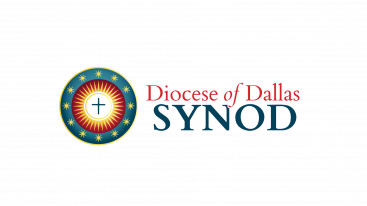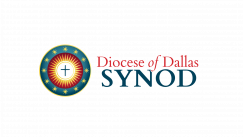ABOUT THE SYNOD
1. What is the Diocese of Dallas Synod?
The Synod is a decade-long process of prayer, listening, discernment, and renewal called by Bishop Edward J. Burns. It began on December 12, 2021, and seeks to strengthen the mission and ministries of the diocese.
2. Why did Bishop Burns call for a diocesan synod?
He called the Synod in 2021 as a post-pandemic pastoral response to renew diocesan life, strengthen evangelization and formation, and prepare for expected growth across North Texas.
3. How long does the synod process last?
The synod spans from December 12, 2021, through December 12, 2031 — a full ten years of consultation, assembly, planning, implementation, and intended renewal. This ending in 2031 coincides with the 500th anniversary of the appearance of Our Lady of Guadalupe to St. Juan Diego.
4. What happened during the listening sessions and Synod Assembly?
Thirty listening sessions across the diocese engaged nearly 9,000 participants and produced more than 4,000 pages of feedback. Delegates were then appointed to meet December 1–4, 2024 to discuss and offer a consultative vote to our Bishop on the 376 resolutions that were shaped from feedback that was gathered through listening sessions.
5. What documents were released on December 12, 2025?
The Post-Synod Pastoral Letter and the Synod Implementation Plan released, providing the spiritual vision and practical direction for diocesan renewal through 2031.
6. How does the Pastoral Plan relate to the Synod Assembly resolutions?
The resolutions reflect what was gathered through the Listening Sessions and discerned by Bishop Burns. Through the input of the Synod Assembly, these resolutions were voted on in a consultative way and prioritized for first action. The Pastoral Plan has organized these priorities into a coordinated structure of pathways, initiatives, and projects for diocesan action.
UNDERSTANDING THE IMPLEMENTATION PLAN
7. What are the Pathways of Renewal?
There are five pathways of renewal. These are the major areas of focus that will guide diocesan renewal efforts. The five pathways are:
- Pathway I: Celebrating the Sacraments
- Pathway II: Proclaiming the Gospel
- Pathway III: Strengthening Families and Individuals in Christ
- Pathway IV: Embracing Missionary Discipleship
- Pathway V: Practicing Faithful Stewardship and Governance
These Pathways will direct how ministries, parishes, and diocesan offices approach long-term planning. They are named from phrases in the new diocesan mission statement, promulgated in the Post-Synodal Pastoral Letter and Plan.
8. What are the initiatives?
There are 16 initiatives and they are specific areas of renewal within the 5 Pathways. Each initiative will help carry out the goals of the synod in a focused and coordinated way. The 16 initiatives are each housed under a Pathway, and all are listed here:
Pathway I: Celebrating the Sacraments
Pastoral Initiatives: Liturgy; Sacramental Preparation & Life
Pathway II: Proclaiming the Gospel
Pastoral Initiatives: Engagement & Outreach; Solidarity & Support
Pathway III: Strengthening Families and Individuals in Christ
Pastoral Initiatives: Catechesis; Identity & Success of Catholic Schools; Prayer & Faith Formation
Pathway IV: Embracing Missionary Discipleship
Pastoral Initiatives: Culture of Vocations; Clergy Formation & Wellness; Lay Minister Formation
Pathway V: Practicing Faithful Stewardship and Governance
Pastoral Initiatives: Victims’ Assistance & Safe Environment; Governance; Facilities; Tribunal; Care for the Catholic Worker; Rapid Response
9. Why does each Initiative include a project?
Each initiative in the pastoral plan includes one project to demonstrate early momentum and begin translating the synod’s vision into action in a clear and visible way. These projects may or may not be the first project completed in each initiative, and there will be other projects developed as results of the Synod Assembly.
10. Will additional projects be added later?
Yes. Dozens of additional projects will begin over the next several years as necessary for the renewal of the diocese, according to what has emerged from the Synod Assembly. These projects will be identified as the implementation process for initiatives continues to develop.
12. When does implementation begin?
Implementation begins immediately after the December 12, 2025 release of the Post-Synod Pastoral Letter and Pastoral Plan.
13. When will projects begin?
Several early-phase projects have already started, with additional projects beginning in 2026 and later.
GOVERNANCE & LEADERSHIP
14. What is the Synod Implementation Commission?
It is a group of 36 clergy, religious, laity, and diocesan leaders appointed by the Bishop who offer consultation and support for the development and implementation of the Pastoral Plan.
15. What are Initiative Advisory Councils?
Most initiatives will have their own Advisory Councils made up of clergy, staff, and lay leaders. These councils are being newly created as a result of the Synod and will assist in designing and supporting projects throughout the implementation phase. They will function under the Implementation Commission.
16. How will parishes, schools, and ministries be involved?
Their crucial involvement will involve local implementation efforts, feedback opportunities, training, and collaboration with diocesan offices. Their involvement will be important to the success of each initiative.
17. What is the role of pastors, presidents, principals, and parish staff?
They will work for renewal in their entities according to the diocesan plan, communicate updates, and support formation or training. Their leadership will help ensure consistent adoption.
18. How will implementation decisions be communicated?
The diocese intends to share updates through official channels such as parish communications, diocesan websites, email updates, and leadership briefings.
WHAT THE FAITHFUL CAN EXPECT
19. How will the Implementation Plan affect my parish?
Parishes may experience new or modified programs, updated formation approaches, or opportunities for training depending on when and how initiatives are adopted at their parish. Specific details will be shared as projects are announced.
20. Will there be changes to sacramental preparation, catechesis, or liturgy?
Some initiatives may eventually lead to updates in these areas. Any changes will be communicated with clarity and supported by training for all affected.
21. How will the plan support families, youth, and young adults?
Several initiatives will include efforts to strengthen discipleship and support for families, youth, and young adults. Details will be announced as projects develop.
22. How will Catholic schools be involved?
Schools will work for renewal in formation efforts, leadership development, or collaborative initiatives that support Catholic identity and mission.
23. Will parish or school staff receive training?
Training opportunities will be offered as initiatives unfold. These will be intended to help staff implement or modify programs or resources connected to the plan.
24. How will implementation be funded?
The diocese may use a mix of existing resources, strategic budgeting, and additional funding approaches. Specific plans will be shared as developed.
25. Will the diocese provide updates on progress?
Yes. The diocese intends to share regular updates and progress reports throughout the implementation phase.
ENGAGEMENT & PARTICIPATION
26. How can parishioners participate in the implementation phase?
Parishioner participation is crucial to diocesan renewal. They may participate through prayer, ministry involvement or leadership, and engagement with parish-level opportunities connected to the initiatives. If parishioners are interested in assisting with this work, it is best to make oneself known with the parish and humbly begin serving where service is needed.
27. Will parishes be asked to provide feedback to how this is going?
Yes, parishes will be invited to share feedback or data to support planning and evaluation. The diocese seeks to maintain an open and collaborative approach in renewal.
28. How can volunteers or ministry leaders get involved?
Opportunities to serve will be shared at the parish or diocesan level as projects unfold. Parish leaders can help direct those interested in assisting.
29. Will there be diocesan-wide formation events connected to the plan?
Some initiatives may include formation, gatherings, or workshops at the diocesan level. These opportunities will be communicated as they become available.
UNDERSTANDING IMPACT
30. How will the Implementation Plan strengthen evangelization and discipleship?
The plan seeks to renew the Church’s mission of bringing people to Jesus Christ and deepening discipleship. Specific efforts will be guided by the 5 pathways and 16 initiatives.
31. How does the plan support vocations?
Some initiatives may include efforts that encourage discernment for priesthood, religious life, marriage, and lay leadership. These efforts will be announced over time.
32. What changes might we see over the next five to ten years?
The diocese anticipates long-term spiritual and pastoral renewal from this effort. Specific outcomes will depend on how projects develop and how parishes and schools adopt these initiatives individually, over time.
SPECIAL TOPICS
33. Does the synod change Church teaching?
No. A diocesan synod cannot change doctrine. It focuses on pastoral priorities, ministry practices, and strengthening the life of the Church.
34. Are there immediate changes parishioners should know about?
Any immediate changes will be communicated by parishes or the diocese. Most efforts will be introduced gradually through the Implementation Plan.
35. Will there be structural changes such as new parishes or administrative shifts?
Structural changes may be considered as needs arise, but no specific changes are being announced at this time.
36. How will the diocese remain transparent during implementation?
The diocese intends to provide periodic updates, share progress, and communicate key developments as the Implementation Plan unfolds.
37. How can parishes and schools prepare now?
Leaders may prepare through prayer, communication, and reviewing current ministries. More specific guidance will be available in early 2026, after the Plan is released.
38. Will the results of the synod become the main focus of the diocese going forward?
Yes. The Implementation Plan will guide diocesan priorities for years to come. This is not a separate initiative but the primary direction for the diocese as a whole.
CLOSING / VISION
39. What is the vision guiding the Implementation Plan?
The vision is to bring people to Jesus Christ, and bring Jesus Christ to His people — renewing the Church’s mission across the Diocese of Dallas.
40. How does the synod connect to the 500th anniversary of Our Lady of Guadalupe?
The Implementation Plan concludes on December 12, 2031, marking this historic anniversary. It symbolizes hope, renewal, and a renewed missionary spirit for the future.

